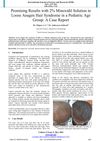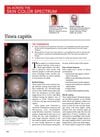
Non-invasive methods can effectively diagnose and manage alopecia areata.
 June 2023 in “JAAD case reports”
June 2023 in “JAAD case reports” The document concludes that "hot comb alopecia" is now called "central cicatricial centrifugal alopecia" and its causes are complex.
 May 2023 in “International journal of science and research”
May 2023 in “International journal of science and research” 2% minoxidil solution improved hair density and quality in children with Loose Anagen Hair Syndrome.

A 12-year-old girl was misdiagnosed with alopecia areata but actually had a nevus sebaceus with a genetic mutation.
 May 2023 in “Plastic and reconstructive surgery. Global open”
May 2023 in “Plastic and reconstructive surgery. Global open” Activated PRP injections are effective in treating hair loss and improving hair density.
 April 2023 in “World Journal Of Advanced Research and Reviews”
April 2023 in “World Journal Of Advanced Research and Reviews” Cosmetic products or emotional factors might contribute to Frontal Fibrosing Alopecia, and trichoscopy is useful for diagnosis.
 April 2023 in “Our Dermatology Online”
April 2023 in “Our Dermatology Online” Trichoscopy is effective in diagnosing trichotillomania by showing specific hair patterns.
 March 2023 in “Photodiagnosis and Photodynamic Therapy”
March 2023 in “Photodiagnosis and Photodynamic Therapy” Low vitamin D levels are linked to severe and active alopecia areata.
 February 2023 in “Facial Plastic Surgery Clinics of North America”
February 2023 in “Facial Plastic Surgery Clinics of North America” Careful planning and skilled surgery can make hair replacement safe and effective.
 February 2023 in “Siriraj Medical Journal”
February 2023 in “Siriraj Medical Journal” Not all cases with typical signs of Alopecia Areata are actually diagnosed as such.
 January 2023 in “Journal of Cutaneous Pathology”
January 2023 in “Journal of Cutaneous Pathology” The study found certain scalp biopsy features can help tell apart alopecia areata from pattern hair loss even when typical immune cells are not seen.
 January 2023 in “Voennaâ medicina”
January 2023 in “Voennaâ medicina” Hair loss in women can improve with iron and vitamin supplements if caused by iron deficiency.
 January 2023 in “Indian Dermatology Online Journal”
January 2023 in “Indian Dermatology Online Journal” Bimatoprost and clobetasol are both effective for scalp hair loss, but bimatoprost works faster, has fewer side effects, and grows more colored hair.
January 2023 in “Journal of Veterinary and Animal Sciences” Dogs with skin lesions often have blood abnormalities and damaged hair.
 December 2022 in “Cureus”
December 2022 in “Cureus” Hormones significantly influence hair growth, with conditions like hirsutism and patterned hair loss linked to hormone levels; more research is needed for full understanding.
 November 2022 in “Journal of Investigative Dermatology”
November 2022 in “Journal of Investigative Dermatology” The lotion with specific plant extracts effectively increased hair growth and improved hair cycle in subjects after 3 months.
 October 2022 in “The Journal of Family Practice”
October 2022 in “The Journal of Family Practice” Tinea capitis is a scalp fungal infection in children that can cause hair loss, scaling, and other symptoms.
 July 2022 in “The journal of investigative dermatology/Journal of investigative dermatology”
July 2022 in “The journal of investigative dermatology/Journal of investigative dermatology” Scurvy still occurs today and can be diagnosed by symptoms like gum bleeding and a specific rash, confirmed by low vitamin C levels.
January 2022 in “Clinical Cases in Dermatology” A 12-year-old boy has a rare, harmless hair loss on his chin with no need for treatment.
January 2022 in “Clinical Cases in Dermatology” Hypothyroidism can cause hair loss, which is often reversible with treatment.
 September 2021 in “CRC Press eBooks”
September 2021 in “CRC Press eBooks” Alopecia areata incognita causes sudden hair thinning, responds well to steroids, and is more common in those with genetic hair loss conditions.
April 2021 in “Aktuelle Dermatologie” Frontal Fibrosing Alopecia is a type of hair loss that mainly affects postmenopausal women, has unclear causes, and lacks evidence-based treatments.
 March 2021 in “CRC Press eBooks”
March 2021 in “CRC Press eBooks” The document concludes that different patterns of hair thickness and scalp changes can help diagnose types of non-scarring hair loss.
February 2021 in “PubMed” A 2-year-old girl had a hair disorder not shared by her identical twin.
 January 2021 in “Indian journal of dermatopathology and diagnostic dermatology”
January 2021 in “Indian journal of dermatopathology and diagnostic dermatology” Trichoscopy is a reliable method for diagnosing hair and scalp disorders quickly and non-invasively.
 January 2021 in “Skin appendage disorders”
January 2021 in “Skin appendage disorders” The report concludes that atypical Brauer nevus is more common in males, present at birth, and often misdiagnosed due to its unusual scalp locations.
January 2021 in “Dermatology online journal” One twin girl has Loose anagen syndrome with poorly anchored hair, diagnosed with a simple hair pull test, while her identical twin does not have the condition.
December 2020 in “Journal of Face Aesthetics” Trichoscopy effectively helps diagnose different types of hair loss in women.
 December 2020 in “Vestnik dermatologii i venerologii”
December 2020 in “Vestnik dermatologii i venerologii” Iron supplements and physiotherapy together can better treat hair loss in women with iron deficiency.
 April 2020 in “Journal of the Endocrine Society”
April 2020 in “Journal of the Endocrine Society” A woman's high testosterone and related symptoms were caused by overactive cells in her ovaries.























